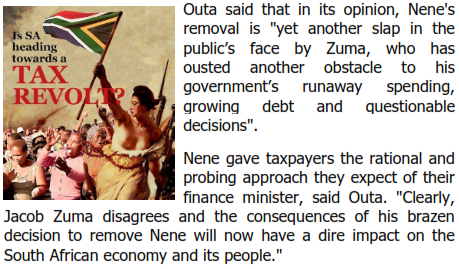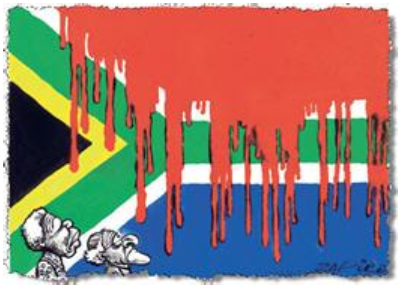CHAPTER 8
And piss them off he certainly did
‘ZUMA FIRES MINISTER OF FINANCE NENE’
‘The warning shot across South Africa’s bows could not have been clearer. Its response could not have been more foolish. On December 4th Fitch, a rating agency, cut its assessment of South African public debt to just one notch above “junk” (financial jargon for bonds that are deemed risky and so must offer a higher interest rate than “investment-grade” debt). Standard & Poor’s, another agency, implied it was likely to downgrade the country’s rating to junk. Both cited concerns about South Africa’s slow rate of economic growth and its spiraling public debt.
Instead of heeding the warning, President Jacob Zuma compounded the damage by firing Nhlanhla Nene, his respected finance minister, on December 9th. (He said he was moving him to “another strategic position”.) Mr Nene had earned the trust of investors (and the irritation of other ministers) by consistently trying to hold the government to its pledge to limit increases in state spending. He was replaced by David van Rooyen, a backbencher so obscure that one member of the shadow cabinet confessed he had to search for him on Google after the appointment to find out who he was.
The rand fell sharply against the dollar, having already slumped to a record low earlier in the week. Zuma did not give reasons for the change but many South Africans suspected it was because Mr Nene had stood up to powerful allies of the president. Earlier in December he had stymied an attempt by Dudu Myeni, the chairman of perennially loss-making South African Airways, to sign contracts that appeared to make little financial sense. Ms Myeni, who is also the chairman of the Jacob Zuma Foundation, a charity, had wanted to renegotiate contracts to lease jet aircraft from Airbus in a way that might have caused the airline to default on its debts.

The change in finance ministers comes at a time when the government is desperately trying to avoid going over an economic precipice. Public debt is rising fast, as are the costs of servicing it. Investors fret that South Africa may soon lose its investment-grade rating, which would trigger a sudden sell-off of its bonds since many fund managers are barred from holding junk-rated debt. That in turn would drive up borrowing costs and potentially force South Africa to consider an IMF rescue.
Under Mr Zuma, who was elected president in 2009, debt has steadily crept up to 45% of GDP from about 26%. That may seem low compared with European countries such as Britain, where public debt is about 80% of GDP. But given its wobbly credit rating, South Africa must pay four times as much interest as Britain on every dollar of debt (8.6%, compared with 1.9%).
Ideally, South Africa would grow its way out of this hole. But growth is expected to be no more than 1% this year. Both Fitch and Standard & Poor’s cited this as a big worry. Yet much of what holds the economy back is within the government’s power to fix. Power shortages that have closed factories and mines, for example, are due to underinvestment by the stateowned electricity firm. Liberalizing the energy market could raise growth by about a percentage point a year.
The country probably has 18 months before its debt might be downgraded to junk. That is enough time to change course, but there is little will. “In the cabinet there are those who understand why a credit rating is important and those who have no clue about what it means,” said an executive at a large South African firm, shortly before the finance minister was axed. Mr Nene understood. And now he is gone.
Why Nene was fired?
The crux of Nene’s fall is not easy to decipher. But two factors seem to have driven the final nail into his professional coffin. The first has to do with his hard stance on the country’s stateowned airline, South African Airways. Nene challenged the board of the state-owned airline, led by Dudu Myeni, to reconsider its intended restructuring of a fleet arrangement with Airbus. The restructuring would have had fiscal implications with the government being forced to make good on its guarantees.
Second, it is apparent that Zuma found the National Treasury and Nene in particular, a stumbling block to a nuclear deal the President is believed to have promised the Russians. It is estimated that the deal could cost as much as R1 trillion. Nene’s allocation of a mere R200m towards research for this programme must have been seen as an insult by Zuma’s cronies and insiders. Zuma believes that this nuclear deal will be a magic bullet for South Africa’s urge to undertake industrialisation on a large scale, address energy deficits and create employment. He may turn out to be right on some of the outcomes, but the push to flout procurement rules and avoid accountability signifies a destruction of institutions. The likely, and more menacing scenario, is deepening corruption. This is more so given Russia’s impoverished corporate governance culture. The nuclear deal, if implemented, could create a feeding trough on a gigantic scale for cadres and cronies while acting as a debt albatross for future generations. At the heart of both the South African Airways saga and the nuclear deal is the failure by the country’s leadership to adhere to accountability and transparency mechanisms, especially the Public Finance Management Act, as well as to grasp the implications of irrational decision-making on the Fiscus and the economy.
A bad omen for South Africa
The markets or economic actors are not familiar with Van Rooyen, Nene’s replacement at the helm of National Treasury. He clearly is someone Zuma considers malleable. The appointment itself was handled clumsily with no forewarning to the markets. This was a serious mistake given the strategic importance of National Treasury. The department stands at the nexus between the domestic economy and global markets.
What we can draw from these changes is that National Treasury has now lost its place of pride as a premier economic nerve centre for government. The cavalier manner in which Zuma has treated this crucial institution will have implications for the economy.
Investor confidence will be negatively affected, and trust in the ability of the ruling party to provide economic leadership severely eroded. Further, there will be a heightened sense of political risk, making it even harder to convince investors about South Africa’s profile as an investment destination. The public debt, which is already hovering close to 50% of the GDP, will balloon, with implications for fiscal sustainability in the future.
Delivery of quality public services, public sector wages, and ability to modernise infrastructure will suffer further. To hope for faster economic growth and job creation under such a scenario is a pipe dream.
What will get South Africa out of the quagmire is a revolt within the ruling African National Congress to challenge Zuma to explain himself and to provide a credible plan to reform and manage the economy.
Second, the local government elections due to be held in early 2016 should be a platform to rebuke government for its shambolic management of the economy.
This article was written by Mzukisi Qobo, Associate Professor at the Pan African Institute, University Johannesburg
Outa warns of tax revolt against Zuma
Dec 11 2015 10:40 Cape Town - Reacting to President Jacob Zuma's firing of Finance Minister Nhlanhla Nene, the Opposition to Urban Tolling Alliance (Outa) said Zuma's "brazen behaviour" has sparked a call for broader civil action.
The civil rights body said the winds of discontent among the South African tax-paying public are strong enough to "fan a fiery backlash that the ruling party will struggle to contain".
"This country and its people can no longer afford to tolerate a situation where blatant abuse of power and politicallyconnected enrichment continues without consequence," said Outa. "It is for this reason that civil society organisations such as Outa and others have the potential to hold our governing authorities to account."

Outa mentioned the example of Gauteng's e-toll scheme, which led to a revolt "by 91% of the Gauteng freeway users who have given the e-toll scheme the finger". According to Outa, e- tolls are being kept alive by a handful of corporates and logistic organisations, many of whom are de-tagging and seeking advice and protection under Outa's e-Toll Defence Umbrella.
Outa said the level of effective civil resistance against e-tolls has been "staggering". The anti-tolls body said it has recently received numerous calls to spearhead a similar public resistance campaign into other areas of what it terms "irrational governance".
Outa chairperson Wayne Duvenage said: "We are obviously taking note of the situation and cautiously assessing all options under the circumstances. A *tax revolt is a worrying situation for any nation to find itself in; however, a careful and collaborative approach with organised business and civil society does have the potential to elicit impactful change.”

Turning to economic matters, the civil rights body said the country's credit situation is already perilously close to junk status. Zuma's move "could very well be the shove that sends us over the brink". Economists have widely criticised Nene's removal, saying his sudden replacement is one of the worst events for an economy that has very little cushioning.
Nomura International emerging markets economist Peter Attard Montalto said he believed Nene was sacked for politicallymotivated reasons. Zuma's move is a serious blow to foreign direct investment and investors, said Motalto. "We view this prioritisation of political issues over reforms as the reason that SA is firmly on the path to junk status."

Outa pointed out that unlike Greece, South Africa enters the possibility of an economic meltdown not because of the actions of its people or any irresponsible conduct by the country's financial institutions, but because of the "relentless political abuse of power and the systemic plundering and squandering of taxpayer money".
Said Duvenage “Certain spheres and issues can only be influenced by collective action and without the power of an effective civil society, all that remains is politics - and politics have failed us today."







